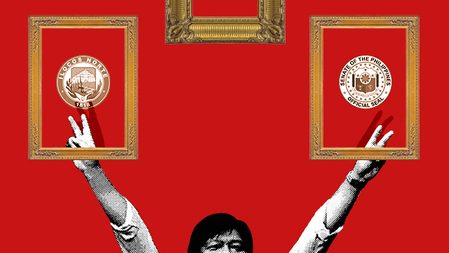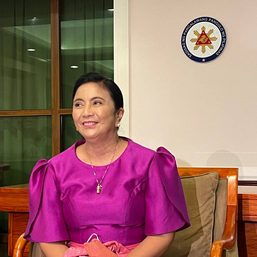SUMMARY
This is AI generated summarization, which may have errors. For context, always refer to the full article.
![[ANALYSIS] A generation that’s losing sleep over Marcos Jr.](https://www.rappler.com/tachyon/2022/02/generation-marcos-TL.jpg)
A chunk of my generation – those who were in college or fresh out of it in the dying years of Ferdinand Marcos’ dictatorship and marched on EDSA to topple him – is nursing anxiety attacks these days. That’s the hard truth that I believe we must now get off our chests.
There are times when we’d find ourselves drowning in remorse or wanting to rake someone over the coals or seeking refuge in the past, in the glory days of a revolution.
Surely this must be a fluke, a glitch that could be fixed in no time?
The probability of another Marcos as president 36 years after his family was booted out in a people power revolt is not just about yet another election. It feels like an indictment of a generation that takes personal pride in having brought down the dictator. It falls like a sword on us who entered the workforce with newfound freedoms, and who had come of age in the post-Marcos decades that followed.
You could not have been on EDSA in those four days of February 1986 and be indifferent to this year’s presidential race. Whether you are now the cynic that’s been burned by the EDSA promise or the hopeless romantic who holds on to it, I figure that May 2022 is as personal to you as it is to me.
Which is why Ferdinand Marcos Jr. got us riled up when he, asked to define “bias,” equated it with being “anti-Marcos.” To be anti-Marcos in the ‘70s and ’80s was to be hunted, maimed, buried – to be pushed aside in a crony-dominated field, to be silenced through the barrel of a gun. To be anti-Marcos was to regret not being an Ilocano in the face of an Ilocanized bureaucracy, an Ilocanized police, an Ilocanized military. To be anti-Marcos was to protest the profligacy and kleptocracy of the Marcos family, who splurged on their parties and mansions and schooling in elite Western schools (where they flunked) – not to mention those shoes – while the sacadas of Negros died of hunger and Filipino breadwinners left the country in search of jobs.
So, no, it’s not that we are biased against Mr. Marcos. It’s that we die each time he denies that his father abused this country. The presidential frontrunner cannot deny us our suffering – nor should he deny us our celebrated memory of how we put an end to it.
But he thinks he can, and he does. And so do millions of his believers.
What happened?
Were we too blinded by our ousting skills, that in the years that followed we made do with a so-so rebuilding of a nation pillaged by Marcos and, to a lesser degree, by the second president we ousted, Joseph Estrada?
Did we get too comfortable in our hard-won public space, that we gated ourselves away from those that ached for needs more basic than the right to speak, such as the right to eat?
How can many Filipinos today see the son of the dictator in an entirely new light, when the most memorable last image of the disgraced First Family in 1986 was that of the cocky son, a handgun tucked in his fatigues, clutching at the last straws of power from the rusty balcony of the presidential palace?
Bungling it
I have read countless explanations for this, footnoted with data, analysis, and perspective. In sum, these explanations say, Ferdinand Marcos Jr. is now near the doorstep of Malacañang because we f___ up.
We turned a blind eye to the senators and House representatives who, to write the laws we needed to rebuild our “democracy,” had to bring in all hues and shapes to their coalition – never mind if some of them conspired with the late dictator in looting government coffers and sowing fear. And even if that included his widow herself, who managed to represent both her home province Leyte in the Visayas (for one term in 1995) and Ilocos Norte, birthplace of Marcos (for three terms from 2010).
Our post-Marcos presidents, perennially battling coups, rebellions, or typhoons, were more preoccupied with fixing a country than making sure the Martial Law years were embedded in our psyche and locked in our memory. Such preoccupation, of course, gave way to the wheeling and the dealing that governance in this part required. Political scientist Julio Teehankee explained this in his dissection of party hopping that caused what he described as the “authoritarian contamination” after EDSA.
And how about the Left, the organized backbone of the anti-dictatorship movement? The left-of-center liberal democrats and the social democrats and the national democrats and the breakaway factions in between? Well, to this day, they continue to burden us with their isms even as their chauvinism and egos drive them to petty squabbles over a shrinking space.
What about us journalists? Suppressed for two decades, the Philippine media acquired so much influence after Marcos’ ouster that many chose to be in bed with power rather than speak truth to it. We see remnants of this today – in propaganda rags masquerading as newspapers; news sites that do PR work for the business and political elite, and harvesting “scoops” from them in the process; columnists who attack and defend – and then collect.
So, yes, to a certain extent we did f___ up.
Power acquits
But can that be the entire story? Let’s give credit to where credit is due.
There is no family as obsessed with reclaiming lost power than the family that we pushed to exile in 1986. Marcos’ widow Imelda knew that the only way to launder their bloodied name was through power. Thus, as soon as she returned from exile in 1991, she paved the road just for one destination: Malacañang.
It hasn’t been easy.
Derided as “Marcos loyalists,” the ragtag band of supporters was relegated to the fringes in the 1990s, holding pockets of noisy protests, showing off those gold certificates, praying with the diamond-studded Imelda in resplendent red. Admit it: we jeered at them.
At occasional parties with my Marcos loyalist relatives, I would be served the same menu of revised history – the evil Cory Aquino and the more evil Cardinal Sin plotted against the best president of all time who will be back in power. I put up with it because I felt, in my own haughtiness, that a bygone era was entitled to its pipe dream.
And the numbers did bear us out.
In 1992, Imelda could only garner slightly more than two million votes in her miserable presidential bid. Ferdinand Marcos Jr. made a run for the Senate in 1995; he lost, landing number 16 in a 12-way race and garnering slightly more than eight million votes.
Finally, a job opening
In 1997, however, the home province of the late dictator suddenly had a job opening for the Marcos heir who never lived there.
The longtime governor, Rodolfo Fariñas, had maxed out his term and decided to run for a congressional seat. With Fariñas’ support, Marcos Jr. ran and won as governor, a post that he held for three terms until 2007.
At this point, the Marcoses and the Fariñases had agreed to live together in peace. City hall and the first district remained with the Fariñas clan, while the Marcoses controlled the provincial capitol and the second district.
After his last term as governor in 2007, Marcos Jr. ran and won for second district representative, which was vacated by his mother. They allowed their recalcitrant cousin, Michael Marcos Keon, to run for governor as a placeholder. Keon held the post for only one term because, by 2010, it was Imee’s turn to rule the province – running against Keon and beating him in a landslide.
In the irony of ironies, the 2010 elections, which their nemesis Benigno “Noynoy” Aquino III won as president, was a watershed for the Marcoses: Marcos Jr. finally won a national seat – the Senate – while Imee was elected governor with the eye for a future national post as well.
Marcos Jr. placed an impressive 7th in an election dominated by the EDSA narrative – which should have been enough to send alarm bells. But the EDSA base was too immersed in Aquino’s victory and the demands of governance that followed. And the nation was yet again caught in what the writer and former Inquirer columnist Conrad de Quiros once described as our “folk democracy,” fixated on “rituals and procedures.”
Aquino’s six years certainly pushed his liberal democratic project and the revival of EDSA’s ideals, but his regime’s flaws became the perfect fodder, too, for a counter-narrative: democracy has done nothing for the many who suffered from its elite proponents.
To be sure, the ground littered with failed promises has been shaking for years, but when he campaigned for president in 2016, Rodrigo Duterte did not only dismiss democracy, he promised he’d break it for the sake of the common good.
This was a candidate who did not care about our past.
Which was why Marcos Jr., by then done with his term in the Senate, pursued him relentlessly, offering to be his running mate practically on bended knees. The Marcoses could already smell Malacañang. And they smelled correctly: he almost became vice president in 2016 despite a Duterte snub and a dying Miriam Defensor-Santiago as his standard-bearer.
Marcos’ biggest enabler
If the 2010 election that made Noynoy Aquino president gave Marcos Jr. his first national win, 2016 would prove to be the runway that he needed for a takeoff.
For Duterte, as president, did not only trash everything that we fought for at EDSA, he also emasculated the institution that bore witness to the brutality and abuse of the Marcos dictatorship: the media.
And then he buried the dictator as a national hero, essentially putting back the Marcoses on a pedestal at a time when Facebook and YouTube were already giving them massive and unvetted platforms for their propaganda.
Imee gained from this; in 2019, she placed 8th in a tight Senate race, getting more than 18 million votes. In Ilocos Norte, too, the Marcoses finally dislodged the Fariñas clan from city hall.
Make no mistake: Duterte not only gave us six years of hell, he also brought us to this moment.
So, yes, our generation did f___ up. But so did the tyrant whose daughter is now campaigning with – and for – a family that her grandmother Soledad once bravely fought. – Rappler.com
Add a comment
How does this make you feel?

![[WATCH] In The Public Square with John Nery: Preloaded elections?](https://www.rappler.com/tachyon/2023/04/In-the-Public-Square-LS-SQ.jpg?resize=257%2C257&crop=414px%2C0px%2C1080px%2C1080px)
![[Newspoint] 19 million reasons](https://www.rappler.com/tachyon/2022/12/Newspoint-19-million-reasons-December-31-2022.jpg?resize=257%2C257&crop=181px%2C0px%2C900px%2C900px)

![[OPINION] The long revolution: Voices from the ground](https://www.rappler.com/tachyon/2022/06/Long-revolution-June-30-2022.jpg?resize=257%2C257&crop=239px%2C0px%2C720px%2C720px)
![[OPINION] I was called a ‘terrorist supporter’ while observing the Philippine elections](https://www.rappler.com/tachyon/2022/06/RT-poster-blurred.jpeg?resize=257%2C257&crop_strategy=attention)
![[Newspoint] Improbable vote](https://www.rappler.com/tachyon/2023/03/Newspoint-improbable-vote-March-24-2023.jpg?resize=257%2C257&crop=339px%2C0px%2C720px%2C720px)



![[In This Economy] Marcos’ POGO ban is popular, but will it work?](https://www.rappler.com/tachyon/2024/07/thought-leaders-marcos-pogo-ban.jpg?resize=257%2C257&crop=255px%2C0px%2C720px%2C720px)
![[Rappler Investigates] POGOs no-go as Typhoon Carina exits](https://www.rappler.com/tachyon/2024/07/newsletter-graphics-carina-pogo.jpg?resize=257%2C257&crop=424px%2C0px%2C1080px%2C1080px)






![[OPINION] If it’s Tuesday it must be Belgium – travels make over the Marcos image](https://www.rappler.com/tachyon/2024/04/tl-travel-makeovers-marcos-image.jpg?resize=257%2C257&crop_strategy=attention)

There are no comments yet. Add your comment to start the conversation.